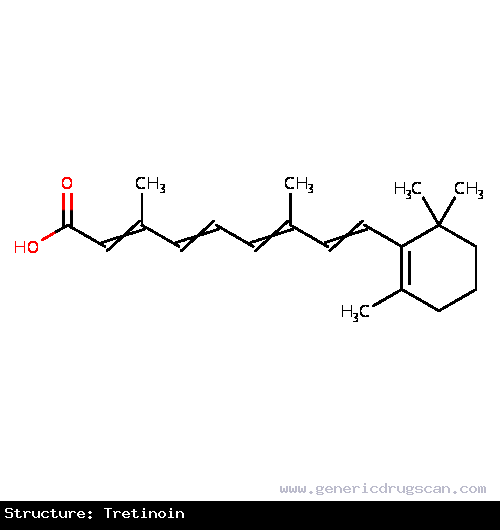Tretinoin Drug: Indication, Dosage, Precaution, Side Effect , Storage, Category Type and corresponding Brands - www.genericdrugscan.com
Tretinoin
Drug Status in USA : ApprovedDrug Status in Canada : Approved
pronunciation
pronounced as (tret' i noe in)
Why is this medication prescribed?
Tretinoin is used to treat acute promyelocytic leukemia (APL; a type of cancer in which there are too many immature blood cells in the blood and bone marrow) in people who have not been helped by other types of chemotherapy or whose condition has improved but then worsened following treatment with other types of chemotherapy. Tretinoin is used to produce remission (a decrease or disappearance of signs and symptoms of cancer) of APL, but other medications must be used after treatment with tretinoin to prevent the cancer from returning. Tretinoin is in a class of medications called retinoids. It works by slowing or stopping the growth of cancer cells by causing immature blood cells to develop into normal blood cells.
How should this medicine be used?
Tretinoin comes as a capsule to take by mouth. It is usually taken twice a day for up to 90 days. Take tretinoin at around the same times every day. Follow the directions on your prescription label carefully, and ask your doctor or pharmacist to explain any part you do not understand. Take tretinoin exactly as directed. Do not take more or less of it or take it more often than prescribed by your doctor.
Continue to take tretinoin even if you feel well. Do not stop taking tretinoin without talking to your doctor.
What are the precautions to be followed?
Before taking tretinoin,- tell your doctor and pharmacist if you are allergic to tretinoin, other retinoids such as acitretin (Soriatane), etretinate (Tegison), bexarotene, or isotretinoin (Accutane, Claravis, Sotret), any other medications, parabens (a preservative), or any of the other ingredients in tretinoin capsules. Ask your doctor or pharmacist for a list of the ingredients.
- tell your doctor and pharmacist what prescription and nonprescription medications, vitamins, nutritional supplements, and herbal products you are taking or plan to take. Be sure to mention any of the following: aminocaproic acid (Amicar); certain calcium channel blockers such as diltiazem (Cardizem, Dilacor, Tiazac, others) and verapamil (Calan, Covera, Isoptin, Verelan); cimetidine (Tagamet); cyclosporine (Sandimmune, Gengraf, Neoral); erythromycin (E.E.S., Erythrocin, E-Mycin); hydroxyurea (Droxia); ketoconazole (Nizoral); pentobarbital; phenobarbital; rifampin (Rifadin, Rimactane);oral steroids such as dexamethasone (Decadron, Dexone), methylprednisolone (Medrol), and prednisone (Deltasone); tetracycline antibiotics such as demeclocycline (Declomycin), doxycycline (Monodox, Vibramycin, others), minocycline (Minocin), oxytetracycline (Terramycin), and tetracycline (Sumycin, Tetrex, others); tranexamic acid (Cyklokapron); and vitamin A. Your doctor may need to change the doses of your medications or monitor you carefully for side effects. Many other medications may also interact with tretinoin, so be sure to tell your doctor about all the medications you are taking, even those that do not appear on this list.
- tell your doctor if you have or have ever had increased amounts of cholesterol (a fat-like substance) and other fatty substances in the blood, or liver or heart disease.
- tell your doctor if you are breast-feeding.
- if you will be having surgery, including dental surgery, tell your doctor or dentist that you are taking tretinoin.
- you should know that tretinoin may cause dizziness or severe headache.Do not drive a car or operate machinery until you know how this medication affects you.
What are possible side effects of this medication ?
Tretinoin may cause side effects. Tell your doctor if any of these symptoms are severe or do not go away:- weakness
- extreme tiredness
- shivering
- pain
- earache
- feeling of fullness in the ears
- dry skin
- rash
- hair loss
- constipation
- diarrhea
- stomach pain
- heartburn
- loss of appetite
- weight loss
- bone pain
- dizziness
- numbness, burning, or tingling in the hands or feet
- nervousness
- depression
- difficulty falling asleep or staying asleep
- confusion
- agitation
- hallucinating (seeing things or hearing voices that do not exist)
- difficulty urinating
- flushing
- headache
- nausea
- vomiting
- blurred or double vision, or other vision problems
- unusual bruising or bleeding
- vomit that is bloody or looks like coffee grounds
- bright red or black and tarry stools
- irregular heartbeat
- hearing loss
- bleeding
- infections
Tretinoin may increase the levels of cholesterol and other fats in your blood and may stop your liver from working normally. Your doctor will monitor you carefully to see whether you are experiencing either of these side effects.
Tretinoin may cause other side effects. Call your doctor if you have any unusual problems while taking this medication.
How to store the medication and dispose it of after its use later?
Keep this medication in the container it came in, tightly closed, and out of reach of children. Store it at room temperature away from excess heat and moisture (not in the bathroom). Throw away any medication that is outdated or no longer needed. Talk to your pharmacist about the proper disposal of your medication.
Drug Category/Class
- Keratolytic Agents
- Retinoids for Topical Use in Acne
- Anti-Acne Preparations for Topical Use
- Anti-Acne Preparations
- Dermatologicals
- Immunosuppressive Agents
- CYP2A6 Inhibitors
- CYP2A6 Inhibitors (strong)
- CYP2A6 Inhibitors (moderate)
- CYP2A6 Inducers
- CYP2A6 Inducers (strong)
- Cytochrome P-450 CYP2C9 Inhibitors
- Cytochrome P-450 CYP2C9 Inducers
- Antineoplastic Agents
- Antineoplas
| Prescribed | For the the induction of remission in patients with acute promyelocytic leukemia (APL), French-American-British (FAB) classification M3 (including ... |
| Weight : | 300.4351 |
| Structure | Tretinoin |
 | |
| Formula | C20H28O2 |
Tretinoin has 45 Brands listed
Search Generic Drugs alphabetically
